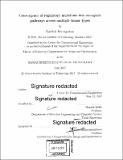| dc.contributor.advisor | Manolis Kellis. | en_US |
| dc.contributor.author | Murugadoss, Karthik | en_US |
| dc.contributor.other | Massachusetts Institute of Technology. Computation for Design and Optimization Program. | en_US |
| dc.date.accessioned | 2017-09-15T15:37:21Z | |
| dc.date.available | 2017-09-15T15:37:21Z | |
| dc.date.copyright | 2017 | en_US |
| dc.date.issued | 2017 | en_US |
| dc.identifier.uri | http://hdl.handle.net/1721.1/111510 | |
| dc.description | Thesis: S.M., Massachusetts Institute of Technology, Computation for Design and Optimization Program, 2017. | en_US |
| dc.description | Cataloged from PDF version of thesis. | en_US |
| dc.description | Includes bibliographical references (pages 65-74). | en_US |
| dc.description.abstract | Cancer sequencing efforts have largely focused on profiling somatic variants in the protein-coding genome and characterizing their functional impact. In this study, we develop a computational pipeline to identify non-coding mutational drivers across multiple tumor types. We describe the non-coding mutational profiles of 854 samples, spread across 15 tumor types, in the context of their respective tissue type-specific reference epigenomes, using recent pan-cancer whole-genome sequencing data. We develop a novel method to detect significantly recurrent non-coding mutations by reestimating the background mutation density while adjusting for epigenomic covariates. Existing databases on enhancer-gene links allow us to capture the convergence of disparate mutations onto downstream target genes. We then systematically identify key immunomodulatory and tumor-suppressive genes enriched for non-coding mutations in their regulatory neighborhood and evaluate these in a pan-cancer context. Taken together, we show that low-frequency alterations converge into high-frequency recurrent events on downstream targets through tissue-specific regulatory interactions. | en_US |
| dc.description.statementofresponsibility | by Karthik Murugadoss. | en_US |
| dc.format.extent | 74 pages | en_US |
| dc.language.iso | eng | en_US |
| dc.publisher | Massachusetts Institute of Technology | en_US |
| dc.rights | MIT theses are protected by copyright. They may be viewed, downloaded, or printed from this source but further reproduction or distribution in any format is prohibited without written permission. | en_US |
| dc.rights.uri | http://dspace.mit.edu/handle/1721.1/7582 | en_US |
| dc.subject | Computation for Design and Optimization Program. | en_US |
| dc.title | Convergence of regulatory mutations into oncogenic pathways across multiple tumor types | en_US |
| dc.type | Thesis | en_US |
| dc.description.degree | S.M. | en_US |
| dc.contributor.department | Massachusetts Institute of Technology. Computation for Design and Optimization Program | |
| dc.identifier.oclc | 1003324173 | en_US |
